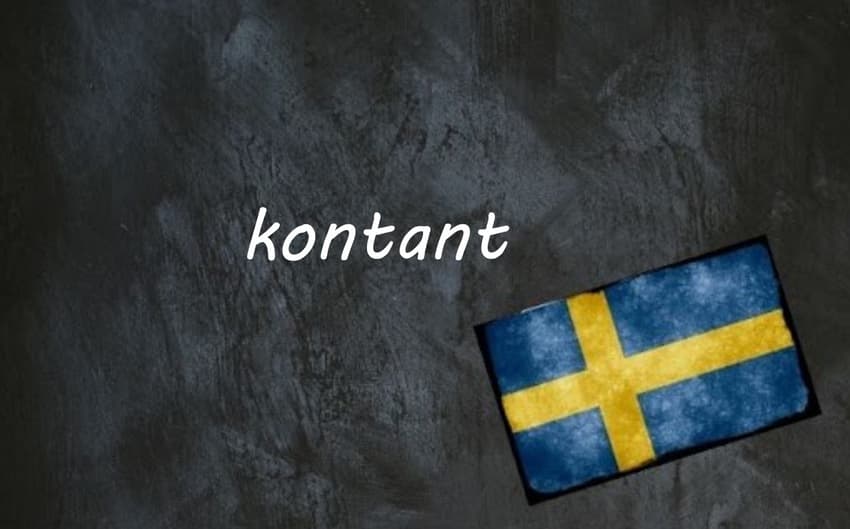Swedish word of the day: kontant

Here's a word that you might think would be a common one, but you'll probably use it less than you'd expect in Sweden.
Kontant means "cash" in Swedish, usually referring to physical money (notes and coins) as opposed to card or online payments.
You can use it to refer to physical payments, for example restaurangen tar bara kontant betalning (the restaurant only takes cash payments), or occasionally to refer to large payments which were made upfront, all in one go.
If you hear something like företaget bjuder 20 miljarder kontant (the company is offering 20 billion in cash), it doesn't mean they literally have the full amount in kronor notes, but rather that they are able to make the entire payment immediately.
Similarly, the phrase köpa hus kontant (to buy a house upfront) means you'd be paying the entire cost of the property in one go rather than taking out a mortgage. Obviously that's not possible for most people, who would take out a mortgage and put down around 15 percent as an upfront deposit, called kontantinsats (cash sum) in Sweden.
- Don’t miss any of our Swedish words and expressions of the day by downloading The Local's new app (available on Apple and Android) and then selecting the Swedish Word of the Day in your Notification options via the User button
Kontant can be used as an adverb in phrases like betala kontant (to pay in cash) and köpa kontant (usually meaning "to buy outright" as outlined above).
To talk about "cash" as a noun, you usually use the plural form kontanter. For example, a cashier might ask har du kontanter? (do you have cash?).
But as Sweden increasingly turns away from cash, you're probably most likely to see kontant used as part of the compound word kontantfri (cash-free).
The word kontant was likely a loan from Italian contante, also meaning "cash". But a few centuries ago, kontant was also used to mean "content" or "satisfied". These days it's almost obsolete in that sense, but you'll still sometimes hear the phrase vara kontant med which means "to get on well with (someone)".
Examples
Allt färre betalar med kontanter
Fewer and fewer people make cash payments
Du kan betala kontant eller med bankkort
You can pay with cash or by card
Villa, Volvo, Vovve: The Local’s Word Guide to Swedish Life, written by The Local’s journalists, is available to order. Head to lysforlag.com/vvv to read more about it – or join The Local as a member and get your copy for free.
It is also possible to buy your copy from Amazon US, Amazon UK, Bokus or Adlibris.
Comments
See Also
Kontant means "cash" in Swedish, usually referring to physical money (notes and coins) as opposed to card or online payments.
You can use it to refer to physical payments, for example restaurangen tar bara kontant betalning (the restaurant only takes cash payments), or occasionally to refer to large payments which were made upfront, all in one go.
If you hear something like företaget bjuder 20 miljarder kontant (the company is offering 20 billion in cash), it doesn't mean they literally have the full amount in kronor notes, but rather that they are able to make the entire payment immediately.
Similarly, the phrase köpa hus kontant (to buy a house upfront) means you'd be paying the entire cost of the property in one go rather than taking out a mortgage. Obviously that's not possible for most people, who would take out a mortgage and put down around 15 percent as an upfront deposit, called kontantinsats (cash sum) in Sweden.
- Don’t miss any of our Swedish words and expressions of the day by downloading The Local's new app (available on Apple and Android) and then selecting the Swedish Word of the Day in your Notification options via the User button
Kontant can be used as an adverb in phrases like betala kontant (to pay in cash) and köpa kontant (usually meaning "to buy outright" as outlined above).
To talk about "cash" as a noun, you usually use the plural form kontanter. For example, a cashier might ask har du kontanter? (do you have cash?).
But as Sweden increasingly turns away from cash, you're probably most likely to see kontant used as part of the compound word kontantfri (cash-free).
The word kontant was likely a loan from Italian contante, also meaning "cash". But a few centuries ago, kontant was also used to mean "content" or "satisfied". These days it's almost obsolete in that sense, but you'll still sometimes hear the phrase vara kontant med which means "to get on well with (someone)".
Examples
Allt färre betalar med kontanter
Fewer and fewer people make cash payments
Du kan betala kontant eller med bankkort
You can pay with cash or by card
Villa, Volvo, Vovve: The Local’s Word Guide to Swedish Life, written by The Local’s journalists, is available to order. Head to lysforlag.com/vvv to read more about it – or join The Local as a member and get your copy for free.
It is also possible to buy your copy from Amazon US, Amazon UK, Bokus or Adlibris.
Join the conversation in our comments section below. Share your own views and experience and if you have a question or suggestion for our journalists then email us at [email protected].
Please keep comments civil, constructive and on topic – and make sure to read our terms of use before getting involved.
Please log in here to leave a comment.